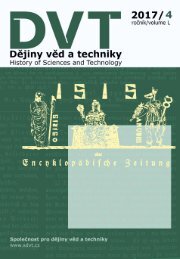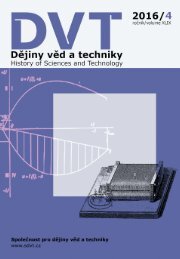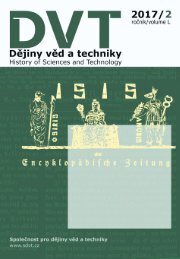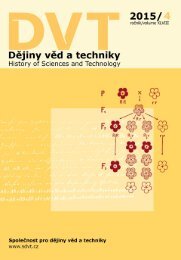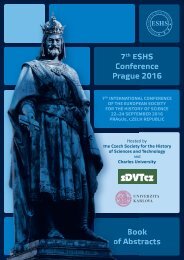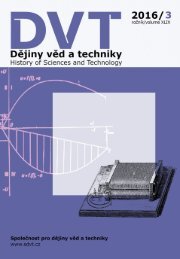Dějiny věd a techniky 2017, 3
DVT 2017, 3 - Obsah, Contents + Recenze, Zprávy z literatury (plné znění vybraných rubrik) český
DVT 2017, 3 - Obsah, Contents + Recenze, Zprávy z literatury (plné znění vybraných rubrik)
český
Create successful ePaper yourself
Turn your PDF publications into a flip-book with our unique Google optimized e-Paper software.
DVT – DĚJINY VĚD A TECHNIKY L (<strong>2017</strong>), 3<br />
několika oblastí – historie matematiky,<br />
logiky, fyziky a astronomie, kulturní historie,<br />
vyučování matematice a nové výzkumy<br />
v matematice. Uveďme pro zajímavost<br />
názvy všech příspěvků:<br />
Historie matematiky – Kalina Bartnicka<br />
(Polsko): A mathematics teacher: between<br />
university and school; Martina Bečvářová<br />
(Česká republika): Gerhard Hermann Waldemar<br />
Kowalewski and his two Prague periods;<br />
Piotr Błaszczyk (Polsko): Euler’s formula –<br />
between standard and non-standard analysis;<br />
Egor Bogatov (Rusko): On the mutual<br />
influence of the Polish and Soviet schools of<br />
functional analysis in the second quarter of XX<br />
century; Sergej Sergejevič Demidov<br />
(Rusko): Professor of the Moscow University<br />
Boleslaw K. Mlodzeevski and mathematics in<br />
Moscow at the end of 19th century – the first third<br />
of 20th century; Stanisław Domoradzki a<br />
Karolina Karpińska (Polsko): The role of<br />
matura examination in mathematics and its<br />
influence on the development of mathematical<br />
culture in the territory of Poland under Prussian<br />
partition and in the first years after regaining<br />
independence; Stanisław Domoradzki,<br />
Michael Zarichnyi a Margareta Stawiska<br />
(Polsko, Ukrajina, USA): Mathematics and<br />
mathematicians in Lvov during World War II:<br />
an attempt at description; Roman Duda<br />
(Polsko): Mathematics at the univer sities of<br />
Kaunas, Poznań and Vilnius in the interwar<br />
period – a comparative study; Emelie Kenney<br />
(USA): Learning and teaching mathematics in<br />
World War II Poland: Experiences of three daring<br />
women; Renata Bujakiewicz-Korońska a Jan<br />
Koroński (Polsko): Genesis of the Cracow<br />
School of Differential Equations; Wiesław<br />
Wójcik (Polsko): Continuum theory and the<br />
research on foundations of geometry in the<br />
Warsaw School of Mathematics.<br />
Historie logiky – Roman Murawski<br />
(Polsko): What are objects of mathematics and<br />
logic?; Paweł Polak (Polsko): Mathematics<br />
and metaphysics: some remarks about Polish<br />
philosophy of mathematics in the second half<br />
of 19 th and the beginning of 20 th century; Jan<br />
Woleński (Polsko): Philosophical ideology of<br />
Polish mathematical school.<br />
Historie fyziky – Andrzej Kajetan<br />
Wróblewski (Polsko): The top ten in physics in<br />
Poland 1915–2015.<br />
Historie astronomie – Oleh Petruk<br />
(Ukrajina): Astronomy in Lviv in the first<br />
half of the XX century.<br />
Historie <strong>věd</strong>y – Zofia Gołąb-Meyer<br />
(Poland): Science in Third Reich – scientists’<br />
attitudes.<br />
Jednotlivé přednášky byly sledovány<br />
se značným zájmem. Doprovázela je živá,<br />
plodná a zajímavá diskuse, v níž účastníci<br />
nalezli prostor pro prezentování svých<br />
myšlenek, názorů, námětů a postřehů.<br />
Postery pojednaly o vývoji zajímavých<br />
matematických výsledků, o životních osudech<br />
a díle několika významných polských<br />
matematiků a logiků, o vývoji národních<br />
matematických a fyzikálních komunit,<br />
o proměnách vyučování matematice a trendech<br />
současného bádání v historii matematiky.<br />
Vystaveny byly následující<br />
prezentace:<br />
Juozas Banionis (Litva): The beginning of<br />
the 20th century. At the roots of mathematics in<br />
the Lithuanian language: Mathematics textbooks<br />
by President A. Smetona; Marlena Fila (Polsko):<br />
Bernard Bolzano and the axiom of<br />
continuity; Karolina Karpińska, Bogumiła<br />
Klemp-Dyczek (Polsko): Otto Reichel’s<br />
construction tasks as an example of work with<br />
gifted gymnasial students in the Torun Gymnasium<br />
in the 19th century; Jan Koroński (Polsko):<br />
Tadeusz Ważewski (1896–1972) and his<br />
results in the field of differential equations; Jan<br />
Koroński (Polsko): Mirosław Krzyżański<br />
(1907–1965) and his publications in the field<br />
218




